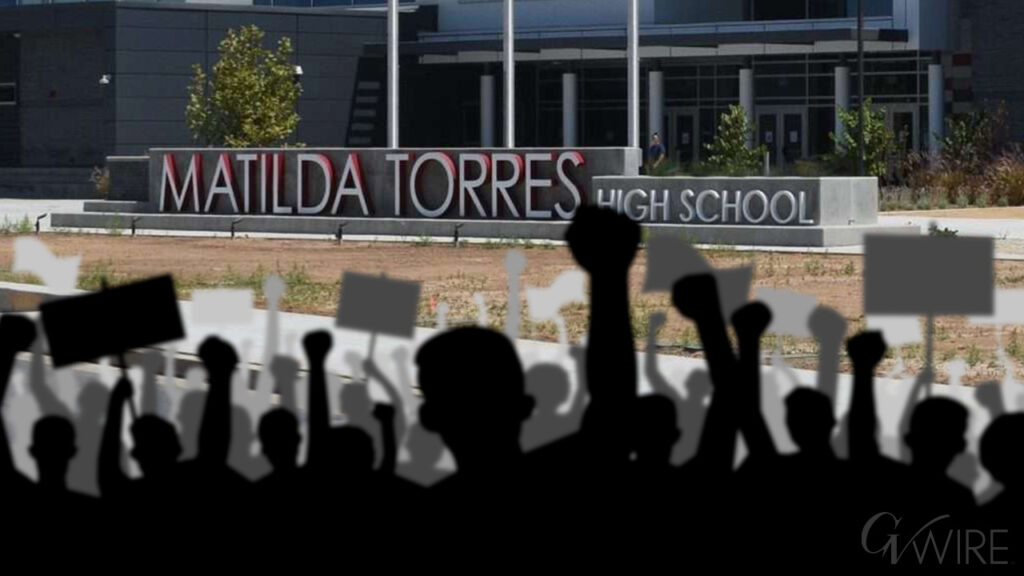ICE agents, in conjunction with local authorities, detain a person during immigration raids in Denver on Feb. 5, 2025. (Chet Strange/The New York Times/File)

- A federal judge on Friday blocked the Trump administration from fast-track deportations of people detained far from the southern border.
- The decision, for now, removes one of the cornerstones of President Donald Trump’s campaign to carry out mass deportations.
- Judge Jia M. Cobb of the U.S. District Court for the District of Columbia noted the aggressive evolution of the administration’s immigration policy.
Share
|
Getting your Trinity Audio player ready...
|
WASHINGTON — A federal judge on Friday blocked the Trump administration from carrying out fast-track deportations of people detained far from the southern border, removing, for now, one of the cornerstones of President Donald Trump’s campaign to carry out mass deportations.
The case focused on a policy shift announced during the first week of Trump’s second term that authorized the Department of Homeland Security to launch quick deportations, across the country and without court proceedings, of immigrants lacking permanent legal status who cannot prove they have lived in the country for more than two years.
Such quick deportations, known as expedited removal, have been carried out for decades, but they were concentrated among people arrested at or near the southern border. The Trump administration sought to expand the practice nationwide, to hasten the removal of people arrested deep inside the country.
‘Acted Recklessly’
In a 48-page opinion, Judge Jia M. Cobb of the U.S. District Court for the District of Columbia wrote that the Trump administration had acted recklessly in a frenzied effort to quickly remove as many people as possible, likely violating due process rights and risking wrongful detentions.
She wrote that the administration had taken over a process that was once as simple as turning back migrants with negligible ties to the United States “after a single conversation with an immigration officer” near the southern border, making it a default practice in places as far away as New York.
“When it comes to people living in the interior of the country, prioritizing speed over all else will inevitably lead the government to erroneously remove people via this truncated process,” Cobb wrote.
A Department of Homeland Security spokesperson said in an email Friday that the ruling “ignores the president’s clear authorities,” and that the department was “exercising its full authority under federal law by placing illegal aliens who have been here for less than two years into expedited removal.”
Trump Administration Has Appealed Previous Deportation Rulings
The Trump administration has been quick to appeal rulings hindering its deportation campaign, meaning Cobb may not have the last word.
The case began the day after the policy was announced, when Make the Road New York, an immigrant rights group, filed a lawsuit to block it. Lawyers from the American Civil Liberties Union argued the case on their behalf.
The group focused on the potential for upheaval and the loss of due process, citing a “widespread failure of immigration enforcement officers to refer noncitizens who express a fear of persecution for interviews with asylum officers.” The lawsuit mentioned a 2005 study commissioned by Congress, which found that in a small sample of expedited removal cases, 15% involved people who had expressed being at risk of persecution in their home country but were never referred to an officer who could evaluate them for an asylum claim.
In reaching her decision, Cobb took particular note of the aggressive evolution of the administration’s immigration policy in recent months.
She wrote that in a race to meet quotas — as high as 3,000 immigration arrests per day — the administration had resorted to staking out courthouses, targeting people pursuing asylum claims and other pathways to remain in the country legally.
Make the Road filed the lawsuit on behalf of its members, many of whom the group argued had been in the country for longer than two years, but were at risk of being swept into expedited removal by traveling without paperwork to prove the length of their residency. Those members were also at risk of never having an opportunity to retrieve the documentation, the lawsuit said.
Cobb echoed those concerns in her opinion, pointing to two people mentioned in the lawsuit who had been in the country for more than a decade but were placed in expedited removal processing after being detained during a traffic stop.
Judge Rejects Government’s Argument
She also forcefully rejected the government’s argument, which has come up in several immigration cases, that migrants who crossed the border illegally forfeited certain protections, such as the right to fight their removal in court. She warned that the argument was so broad that it could easily ensnare U.S. citizens.
“In defending this skimpy process, the government makes a truly startling argument: that those who entered the country illegally are entitled to no process under the Fifth Amendment, but instead must accept whatever grace Congress affords them,” she wrote.
“Were that right, not only noncitizens, but everyone would be at risk,” she added. “The government could accuse you of entering unlawfully, relegate you to a bare-bones proceeding where it would ‘prove’ your unlawful entry and then immediately remove you.”
Trump similarly tried to expand expedited removal nationwide during his first term, but his efforts stalled in court.
Although a federal appeals court eventually allowed the Department of Homeland Security to move forward with the expansion in late 2020, the fight carried over into Joe Biden’s presidency, and the department rescinded the policy.
In temporarily prohibiting the Trump administration from applying expedited removal in vastly expanded ways, Cobb wrote that the ruling was designed to mitigate against the “high risk of error” the new policy introduced.
“By merely accusing you of entering unlawfully, the government would deprive you of any meaningful opportunity to disprove its allegations,” she wrote. “Fortunately, that is not the law.”
This article originally appeared in The New York Times.
By Zach Montague/Chet Strange
c.2025 The New York Times Company
RELATED TOPICS:
Categories

Trump Signs Order Aimed at Curbing State AI Laws


















